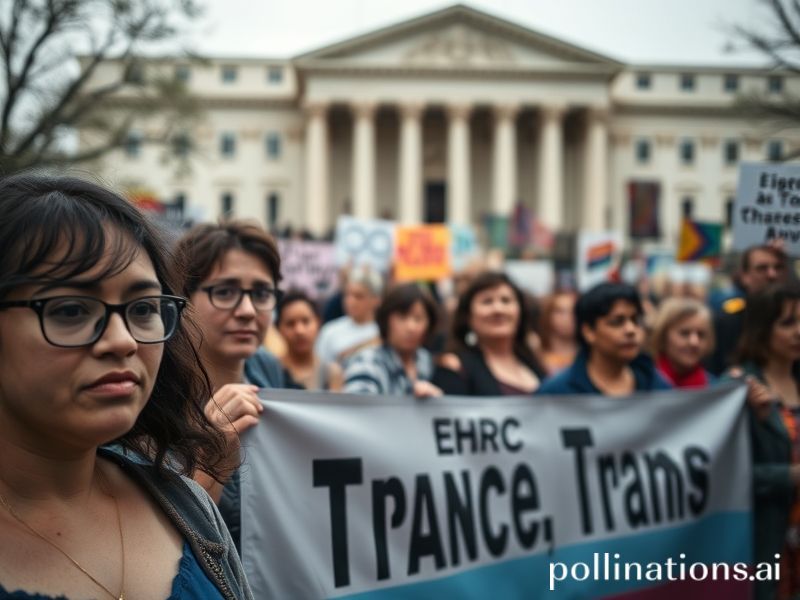EHRC Guidance on Trans Rights: The Internet’s Latest Culture War Battleground
**Title: “EHRC Guidance on Trans Rights: The Internet’s Latest Culture War Battleground”**
Alright, folks, buckle up! We’re diving headfirst into the latest internet culture war, and this time, it’s all about the **Equality and Human Rights Commission (EHRC)** and their guidance on trans rights. If you’ve been living under a rock (or just trying to avoid Twitter for your mental health), let me catch you up.
**What’s the fuss about?**
The EHRC, the UK’s national equality body, recently published guidance on the **Equality Act 2010** and how it applies to **transgender people**. The guidance covers everything from single-sex spaces to gender recognition certificates. Sounds dry, right? Wrong! This is internet fuel, and the digital masses have been chowing down.
**Why is this trending globally?**
1. **Culture Wars 2.0**: The internet loves a good culture war, and trans rights are the new battleground. The EHRC guidance has become a rallying cry for both sides, with hashtags like **#TransRightsAreHumanRights** and **#EHRCGuidance** trending globally.
2. **Celebrity Endorsements**: High-profile figures like **J.K. Rowling** and **Elliot Page** have weighed in on the debate, bringing it to the mainstream and sparking endless memes and hot takes.
3. **The Great British Bake Off Effect**: The UK’s favorite baking show has been at the center of the storm, with fans and critics alike debating the implications of the EHRC guidance on the show’s future. Because nothing says “culture war” like a Victoria sponge, am I right?
**Cultural Context**
The EHRC guidance is part of a broader global conversation about **trans rights, gender identity, and inclusivity**. From **bathroom bills** in the US to **gender recognition laws** in Europe, this is a hot topic that’s not going away anytime soon.
In the UK, the debate has been particularly heated, with **trans rights activists** pushing for greater recognition and protection, and **gender-critical feminists** arguing for the protection of single-sex spaces. The EHRC guidance has become a lightning rod for these tensions, with both sides claiming it as a victory or a betrayal.
**Social Impact**
The EHRC guidance has had a significant impact on social media, with **Twitter, Reddit, and TikTok** all playing host to heated debates, memes, and hot takes. It’s also sparked real-world action, with **protests, petitions, and even calls for a boycott of the Great British Bake Off**.
But perhaps the most significant impact has been on **trans people themselves**. For many, the EHRC guidance is a vital step towards greater recognition and protection. For others, it’s a reminder of the ongoing struggle for acceptance and equality.
**Why is this significant?**
The EHRC guidance is significant because it’s part of a broader global conversation about **trans rights, gender identity, and inclusivity**. It’s a reminder that these issues are not just abstract debates, but real-world struggles that affect real people.
Moreover, the guidance is a testament to the power of the internet to shape public discourse. What started as a dry legal document has become a global trending topic, sparking debates, memes, and real-world action. It’s a reminder that in the digital age, nothing stays offline for long.
**Conclusion**
So there you have it, folks. The EHRC guidance on trans rights is the latest internet culture war, and it’s not going away anytime soon. Whether you’re a trans rights activist, a gender-critical feminist, or just a curious bystander, this is a debate that’s worth following.
But remember, as you scroll through the endless hot takes and memes, to keep one thing in mind: **this is about real people, real struggles, and real lives**. So let’s keep the debate respectful, informed, and, where possible, a little bit funny.
After all, if we can’t laugh at the absurdity of the internet culture wars, we might as well give up now.







